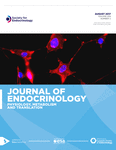20 YEARS OF LEPTIN: Human disorders of leptin action
- MRC Metabolic Diseases Unit, Metabolic Research Laboratories, Wellcome Trust–MRC Institute of Metabolic Science, NIHR Cambridge Biomedical Research Centre, Addenbrooke's Hospital, University of Cambridge, Cambridge, UK
- Correspondence should be addressed to I S Farooqi; Email: isf20{at}cam.ac.uk
Abstract
The discovery of leptin has provided a robust framework upon which our current understanding of the mechanisms involved in energy homeostasis has been built. In this review, we describe how the identification of humans with mutations in the genes encoding leptin and the leptin receptor and the characterisation of the associated clinical phenotypes have provided insights into the role of leptin-responsive pathways in the regulation of eating behaviour, intermediary metabolism and the onset of puberty. Importantly, administration of recombinant human leptin in leptin deficiency represents the first mechanistically based targeted therapy for obesity and has provided immense clinical benefits for the patients concerned. In subsequent years, we and others have shown that human obesity can result from a multiplicity of defects in the pathways downstream of leptin signalling within the brain.
- Received in final form 20 August 2014
- Accepted 27 August 2014
- © 2014 Society for Endocrinology











